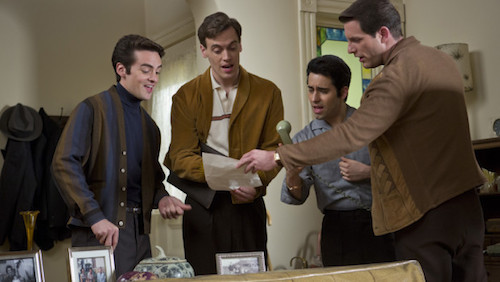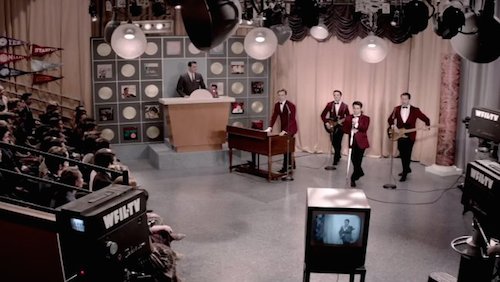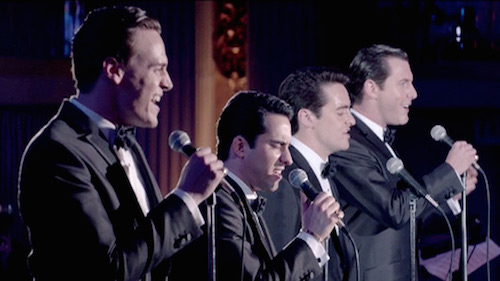Synopsis: From director Clint Eastwood comes the big-screen version of the Tony Award-winning musical “Jersey Boys.” The film tells the story of four young men from the wrong side of the tracks in New Jersey who came together to form the iconic 1960s rock group The Four Seasons.
Release Date: June 20, 2014 MPAA Rating: PG-13
Genre(s): Musical, Drama
Film Review

Production
Any successful Broadway show is bound to get adapted into a movie, whether it’s Death of a Salesman or Grease. The newest play to get the Hollywood treatment is the hit musical Jersey Boys.
Jersey Boys follows the career of Frankie Valli (Tony Award winner John Lloyd Young from the Broadway production) and the Four Seasons as they rise from street hooligans to pop music superstars. It begins at the beginning, with Frankie meeting guitarist and bandleader Tommy DeVito (Vincent Piazza from “Boardwalk Empire”). A talented singer, Frankie gains the attention of mobster Gyp DeCarlo (Christopher Walken from The Deer Hunter), who helps to keep the young Frankie out of trouble so he can have a successful music career. With the members of Tommy’s band constantly in and out of jail for petty crimes, Tommy and bassist Nick Massi (Michael Lomenda from the touring company of “Jersey Boys”) turn to Frankie when they find themselves without a lead vocalist. The puzzle is completed when the boys are introduced to Bob Gaudio (Erich Bergen, also from the “Jersey Boys” touring company), a keyboard player with a knack for writing catchy tunes. With the help of producer Bob Crewe (Green Lantern‘s Mike Doyle), the group churns out hit after hit, but all of the fortune and fame eventually starts to take its toll, especially on Tommy. After all the money, women, and booze, the guys need to remember what’s important – the loyalty of their friendship, and the music. Always the music.

Directed by Clint Eastwood (J. Edgar), Jersey Boys may be a perfect Hollywood adaptation of a Broadway musical – it keeps the spirit of the original production, but makes it more cinematic. The script for the film was written by Marshall Brickman and Rick Elice, the pair who wrote the musical book for the stage show, so the plot is faithful enough to the show so that fans aren’t going to call foul. However, Eastwood puts a darker spin on the story, giving the film a Goodfellas meets That Thing You Do! feel to it. The point of the show was to illustrate that The Four Seasons were not just four guys singing under a streetlight; that they were young men with real problems with the law, their parents, and girls. But, the show always kept the music in the forefront, while Eastwood’s film concentrates on the drama. The music is still always present, but there’s much more to the movie. Onstage, The Four Seasons are happy-go-lucky entertainers, smiling and interacting with each other, but offstage, it’s a different story. The band is like a four-way marriage, with the music being the children for which the parents are staying together.

Overall, Jersey Boys translates very well to the big screen. It’s obviously a movie, not even trying to be a cheap imitation of the show, but it is staged like a play in places with plenty of long takes and master shots. The four leads are all great, and their chemistry helps a lot; there’s a live feel to the film that can’t be faked through editing and camera trickery. In the group’s first meeting with Bob Gaudio, Bobby sits down at a piano and plays his newest song for the group: “Cry for Me.” One by one, the guys join in, first Frankie on vocals, then Nick and Tommy on bass and guitar. The moment is electric, and the performances of the cast make it near-perfect cinema.
Jersey Boys is what it is; a story of loyalty, friendship, betrayal, and redemption, told from the lips of the guys who experienced it and set to a background of amazing music. As far as rock & roll movies and Hollywood musical adaptations go, it’s one of the best.

Directing
Clint Eastwood has proven himself to be one heck of a director, and he’s not afraid to make interesting decisions with his films. The most significant thing that he does with Jersey Boys is that he doesn’t treat it like a Broadway musical. However, he does retain an important aspect of the show – the first-person narration. Each section of Jersey Boys is narrated by a different member of the group, and the best directorial decision that Eastwood makes is to have the storyteller break the fourth wall and address the audience directly. All four leads are very charismatic, and Eastwood gives them each a chance to win the audience over Woody Allen-style, looking right into the viewer’s eyes. The guys will drop everything, sometimes in the middle of a song, to clarify or explain something, and it gets really interesting when their different stories don’t exactly jive with each other.
There’s also a head-scratching decision Eastwood makes involving the film’s ending (and this is not a spoiler). The film concludes with a “curtain call” just before the closing credits, featuring the four leads singing “December, 1963 (Oh, What a Night)” while the rest of the cast slowly filters in, dancing and prancing along with them. It’s pretty baffling; the intent is to give the audience one last look at the company, but that’s a theater thing. It doesn’t really work in the movie – the audience doesn’t know whether they’re supposed to be clapping or walking out the door. For such a great film, it’s a conclusion that almost ruins the whole vibe. Not quite, but almost.

Musical Numbers
It goes without saying that the movie adaptation of a Broadway musical needs to have great music, and the songs in Jersey Boys do not disappoint. Unlike many Hollywood musicals, the songs are all diegetic, being performed by the band organically instead of having characters just suddenly burst into song in the middle of a scene. With a few exceptions, the soundtrack is made up of hit songs made famous by Frankie Valli and The Four Seasons, songs like “Sherry,” “Big Girls Don’t Cry,” and “Walk Like a Man” that were mostly written by the real Bob Gaudio and Bob Crewe. The songs are all part of the lexicon of rock and roll history, familiar to the point of memorization to audiences. The versions in the film are performed by the cast members instead of the original artist, which adds to the authenticity of the movie and gives a modern feel to the note-perfect renditions. Like the Coen Brothers did with Inside Llewyn Davis, Clint Eastwood had the actors sing their parts live rather than lip-sync to a recording. With three of the four leads coming from stage productions, the vocals are still flawless, but the songs have a live and raw feel, particularly when the men are rehearsing their harmonies without accompaniment. The music for Jersey Boys is well done and fun, and familiar enough that audiences will leave the theater trying in vain to imitate Frankie Valli’s falsetto.

Cast and Crew
- Director(s): Clint Eastwood
- Producer(s):
- Screenwriter(s): Marshall BrickmanRick Elice
- Story:
- Cast: Vincent Piazza (Tommy DeVito)John Llyod Young (Frankie Valli)Steve Schirripa (Vito) Christopher Walken (Gyp DeCarlo)Kathrine Narducci (Frankie’s Mother)Lou Volpe (Frankie’s Father)Johnny Cannizzaro (Nick DeVito)
- Editor(s): Joel Cox
- Cinematographer: Tom Stern
- Production Designer(s):
- Costume Designer:
- Casting Director(s):
- Music Score:
- Music Performed By:
- Country Of Origin: USA
